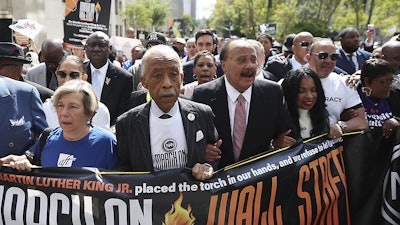
Thursday's "March on Wall Street" drew thousands to Manhattan's Financial District, but among the clergy, labor and community leaders were hundreds of higher education advocates who had traveled from every corner of the nation, transforming the demonstration into an unlikely convergence of campus and community activism.
The 45-minute march through downtown Manhattan carried special significance, timed to coincide with the anniversary of the Civil Rights-era March on Washington in 1963. But this time, the target wasn't the nation's capital—it was corporate America's headquarters.
"We come to Wall Street rather than Washington this year to let them know, you can try to turn back the clock, but you can't turn back time," Sharpton said as the demonstration began at New York’s popular Foley Square.
For the academics who joined the march, Sharpton's words resonated with particular urgency. Since returning to the White House in January, President Donald J. Trump has successfully moved to end DEI programs within the federal government and warned schools to do the same or risk losing federal money.
Dr. Harold Williams, an adjunct sociology professor from Philadelphia who had driven three hours with a van full of colleagues, clutched a handmade sign reading "Education is Democracy."
"We're watching the systematic destruction of everything we've worked to build," said the 63-year-old educator, who was just one when his mother brought him to Washington, D.C. on August 28, 1963 to hear Dr. Martin Luther King, Jr., deliver his famous “I Have a Dream” speech. "They're not just cutting programs, they're cutting the pathways that opened higher education to an entire generation of students."
Among the crowd that gathered near the African Burial Ground—the largest known resting place of enslaved and freed Africans in the country—Dr. Michael Eric Dyson's voice carried the weight of history and the urgency of the present moment.
The prominent Vanderbilt University professor and public intellectual delivered a rousing address along with a litany of other activists including Marc H. Morial of the National Urban League, Maya Wiley of the Leadership Conference on Civil and Human Rights, and Randi Weingarten of the American Federation of Teachers.
"Well, you know, people often ask, what was it like? They look at the grainy black and white photos of Martin Luther King Jr. and Ralph Abernathy and Rosa Parks and Ella Baker and Diane Nash and John Lewis. What was it like to be with them?" Dyson said in an interview with Diverse.
"Well, you know right now, these are the times that define us. These times to future generations will be remarkable. What did you do with the fascist presidency, with an authoritarian man, with an autocrat who was attempting to absorb for himself all the power that was not due him? Well, this is what it looks like."
Dyson's words particularly resonated among the young activists in the crowd—students who had grown up during an era of increasing attacks on institutional knowledge and educational access.
The logistics of moving academics from campuses nationwide told its own story of commitment. Many had used personal funds or organized fundraisers to join what some called an "academic pilgrimage" to stand with Sharpton and the broader civil rights community. Howard University organized a busload from the nation’s capital.
Jonah Cohen, 18, a freshman at City College of New York, said that he was energized by the public demonstration of activism.
"This is our moment," he said of the student turnout. "We are no longer accepting these attacks without a fight. We are fighting back against those who want to take us back to an uglier America. We see a better country."
State Assembly Member Zohran Mamdani, the Democratic candidate in the upcoming New York City mayoral race, marched alongside some of the professors and students, embodying the coalition between academic and political leadership that advocates say is necessary to resist the rollbacks.
The National Action Network's strategy of encouraging consumer boycotts of retailers that have scaled back DEI policies resonated with many academics who said that they understood the connection between corporate and educational equity initiatives.
"Corporate America wants to walk away from Black communities, so we are marching to them to bring this fight to their doorstep," Sharpton said.


















